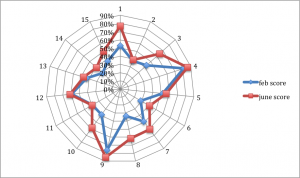Achieving wellbeing has been the concern of philosophers since Aristotle, and is, in many respects the essence of human existence. In recent years, wellbeing has moved from the realm of philosophy to that of science. There has been a growing body of research into what contributes to the quality of people’s experiences of their lives. This has enabled a new understanding of the factors that both influence and constitute wellbeing.
The definition of wellbeing is often abstract. The Public Health White Paper “No Health without Mental Health” (2011) says that wellbeing relates to the absence of mental ill health “the ability to cope with life’s problems and make the most of life’s opportunities. It is about feeling good and functioning well, both as individuals and collectively.”
Good mental wellbeing is the cornerstone of every life and just as important as good physical health. At least one in four people will experience a mental health problem at some point in their life and one in six adults has a mental health problem at any one time.
Through coaching you can improve your wellbeing by focusing on the fundamentals of the way we live our life. It is not just whether we are exercising, eating well and not getting stressed, but what is underneath that impacts on the real change. The mental wellbeing coaching model© takes into account existing and new research and suggests the following stages to wellbeing:
Values
The rules by which we live our life, the very core of our being. It is values that affect the decisions we make, the life choices and how we respond to situations we experience.
BeliefsThese are more than beliefs in the religious sense; it is something that we believe to be true about ourselves and about the world that we live in. Beliefs are fundamental in either helping or hindering us to achieve what we want from life.
Goals/Life Purpose
This is the target we are aiming for and ultimately, what we need to do in our lives to feel fulfilled. Someone living to their life purpose will have their beliefs, values and goals aligned and be in accordance with how they want to live their life, it is at the very cornerstone of wellbeing.
Emotional Wellbeing
This is the way we collect, store and process information. It is about the mood we wake up with in the morning and how we manage ourselves during the day, what emotions we are holding and whether they are serving us well. Happier people tend to have healthier lifestyles (Watson, 1988), more friends, and also more positive interpersonal experiences” (Diener et al., 1999).
Emotional Intelligence
Emotional intelligence as described refers to our ability to manage our emotions, respond to the emotions of others and how we emotionally cope with life. It affects our ability to stay resourceful, build and improve successful relationships, manage ourselves and to create the conditions of happiness, success and fulfilment in our lives.
In March 2008 Dame Carol Black conducted a review of the health of Britain’s working age population, her report titled “Working for a healthier tomorrow” discusses the critical importance placed on improving the health of the working population in order to secure higher economic growth and increased social justice. “Life expectancy and numbers in employment are higher than ever before, yet around 175 million working days were lost to illness in 2006. This represents a significant cost, not only economically, but also in terms of social exclusion.” (Black, C, Working for a healthier tomorrow, 2008)
The review sought to establish the foundations for a broad consensus around a new vision for health and work in Britain.
Interest in Wellbeing has continued to grow since 2008 and the New Economics Foundation (nef) has set out a radical proposal to guide the direction of modern societies and the lives of people who live in them. In contrast to the research carried out previously focusing narrowly on economic indicators, the nef has called for Governments to directly and regularly measure people’s subjective wellbeing ie their experiences, feelings and perceptions of how their lives are going, as a new way of assessing societal progress.
THE RESEARCH
During the period January – July 2014, 16 people took part in a structured research trial to assess the Coaching for Wellbeing Model© as an effective route for improving wellbeing. The programme involved one training day, two coaching sessions and weekly online coaching modules according to the 5 Core Areas of Coaching for Wellbeing according to the model
 These results provide an illustration of how personal wellbeing is impacted on by the components of the model with measurements detailed according to the components and subcomponents of Wellbeing as laid out in the National Accounts Framework.
These results provide an illustration of how personal wellbeing is impacted on by the components of the model with measurements detailed according to the components and subcomponents of Wellbeing as laid out in the National Accounts Framework.
The results above demonstrate the overall change in wellbeing scores for the participants at the beginning and end of the programme. There was a 27% average improvement per participant, with individual improvement up to 82%. In particular, they show:
- 3/15 gained a 50% or more improvement overall
- 5/15 experienced a 25%-49% improvement
- 1/15 experienced a 10-24% improvement
- 6/15 experienced less than 10% improvement
- 10 were below European average of 50% at the start of programme
- 5 were below EU average at the end
- the biggest improvements came from those that scored well below EU average at start of programme
The results were broken down into eight components according to the National Accounts of Wellbeing framework:
- Positive feelings
- Absence of negative feelings
- Satisfying life
- Vitality
- Resilience and self-esteem
- Positive functioning.
- Supportive relationships
- Trust and belonging
The biggest improvements were seen in the area of Emotional Wellbeing, made up from Positive Feelings and Absence of negative feelings.
The results are a positive start to demonstrate the difference that Coaching for Wellbeing can make and the influence we have over our own wellbeing.
The Coaching for Wellbeing programme is a programme that can be aligned with your Organisational situation and requirements. The programme can be offered on an individual basis or as part of a group workshop. Please contact me for further details about your personal requirements.
For details of our next Open Course, click here
To read more about the Research carried out by Coaching for Wellbeing, click here: Coaching for Wellbeing Research Report 2014

